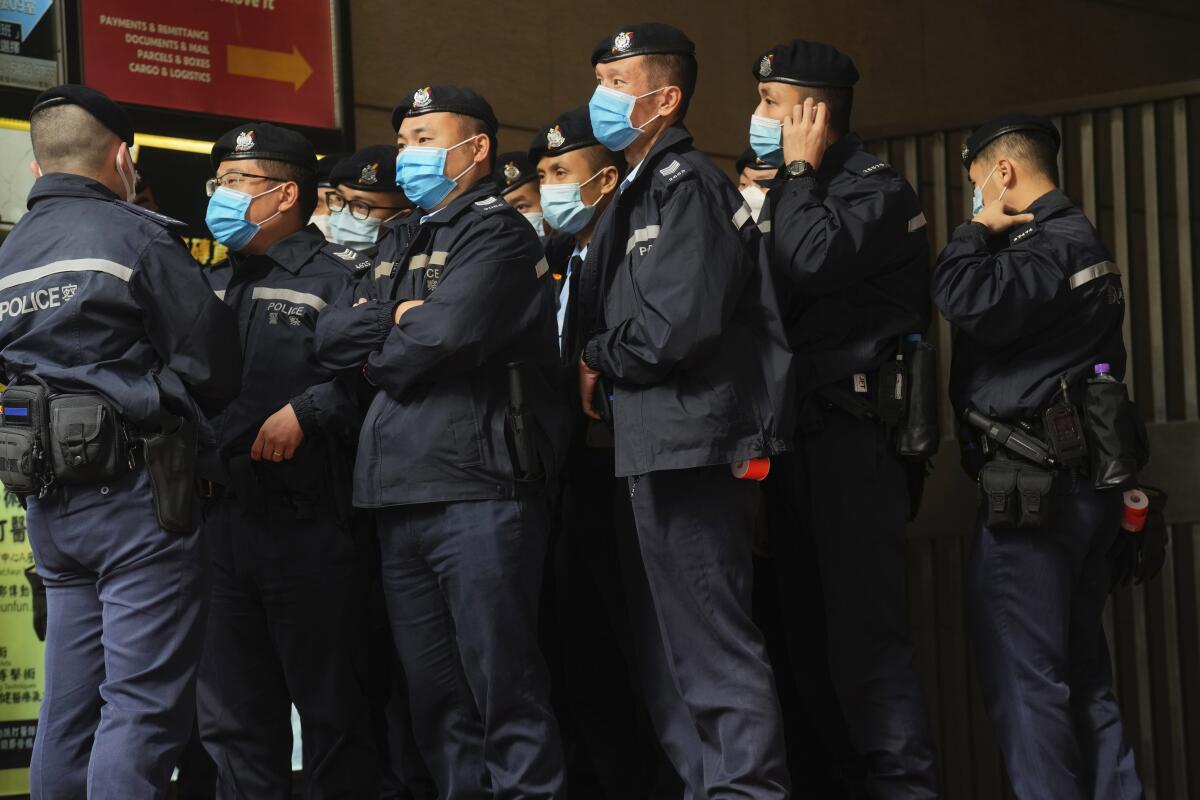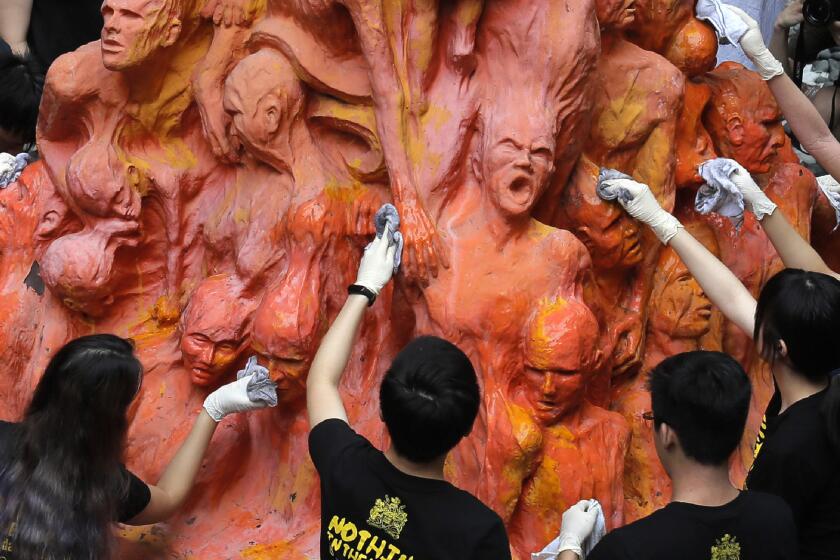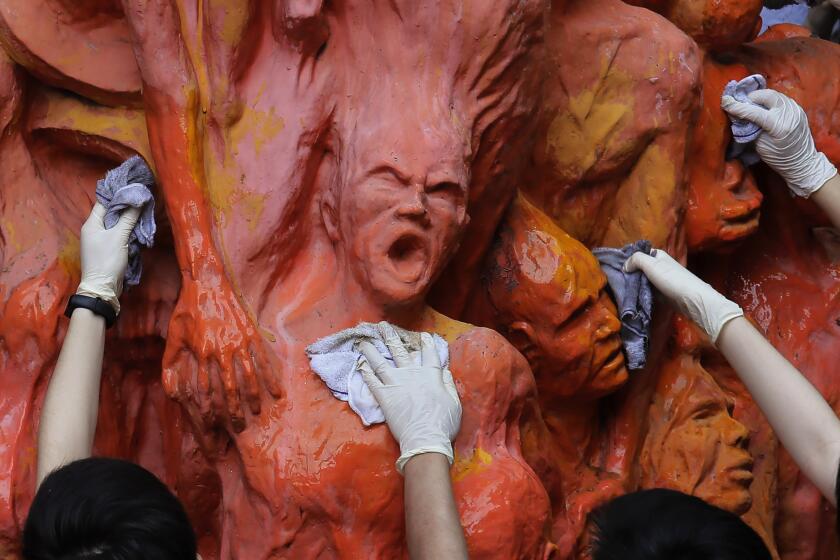Yet another Hong Kong news outlet closes amid Beijing’s crackdown on dissent

- Share via
HONG KONG — A group of lawmakers loyal to China’s Communist Party was sworn in to Hong Kong’s Legislature on Monday following an election without opposition candidates, as yet another pro-democracy news outlet announced it could no longer operate amid a growing crackdown on freedoms in the territory.
The former British colony that was returned to China in 1997 was once known as a haven for dissent and freedoms of the press and expression not seen on the mainland. But the central government in Beijing has clamped down in the last year, leading to the closure of independent news outlets, the removal of monuments to dissent, and a poorly attended election swept by pro-Beijing politicians.
The founders of Citizen News said the site will stop publishing Tuesday. Although they have received no order to close, they said Monday that deteriorating media freedoms in the financial hub put them in an impossible position.
“We all love this place, deeply. Regrettably, what was ahead of us is not just pouring rains or blowing winds, but hurricanes and tsunamis,” Citizen News said in a statement on Sunday, when it announced the closure.
The outlet is the third to close in recent months, following the shuttering of the territory’s last pro-democracy print newspaper, Apple Daily, and the online site Stand News.
Citizen News was founded in 2017 by a group of veteran journalists. The small site focused on political news and analysis pieces, as well as investigations — and in recent months became a refuge for many journalists who had lost their jobs when other outlets closed or faced other pressures.
For Hong Kong’s pro-democracy movement, 2021 saw the city’s authorities and the Beijing government stamp out nearly everything it had stood for.
“With Apple Daily’s sudden closure in the past summer, the journalism majors who were originally supposed to intern with them, Citizen News made arrangements to take them in, so that students wouldn’t lose this internship opportunity,” said Vivian W.W. Tam, a senior lecturer at the Chinese University of Hong Kong’s journalism school, in a public Facebook post. Tam declined to be interviewed.
But a new sweeping National Security Law — imposed on Hong Kong by China’s central Legislature — has made independent reporting increasingly dangerous. Journalists and political activists have been arrested under the law, and it has forced civil rights groups and unions to disband. Many more activists have fled.
Meanwhile, new laws have changed how Hong Kongers vote for their representatives, including a requirement that any who seek office must be “patriots,” effectively bringing the body under Beijing’s control.
“What we understood about press freedom has changed a lot,” said Chris Yeung, founder and chief writer at Citizen News.
The dismantling of the ‘Pillar of Shame’ sculpture at the University of Hong Kong comes a day after landslide election wins by pro-Beijing candidates.
Yeung said at a news conference Monday that the decision to shut down was triggered by what happened to Stand News. Last week, authorities raided Stand News and arrested seven people — including editors and former board members — for allegedly conspiring to publish seditious material. Stand News announced on the same day that it would cease to operate.
Two of Stand News’ former editors who were arrested were formally charged with sedition.
In the summer, authorities forced the closure of Apple Daily, the newspaper owned by media tycoon and democracy activist Jimmy Lai. Lai is in jail and was newly charged with sedition last week.
“I fear that this will turn Hong Kong into a black box, that no one will be informed,” said Chung Ching Kwong, the project manager at the Committee for Freedom in Hong Kong.
She said that although Citizen News had not been contacted by authorities, she views the closure as forced.
“I think in general the closures … are basically involuntarily because there’s this fear that they cannot do real and genuine journalism in the current political environment in Hong Kong,” said Kwong, an activist from Hong Kong who now lives in Germany.
The Society of Publishers in Asia, a group based in Hong Kong that hosts an annual journalism award, also said Monday it is concerned about pressures against independent media in the city.
The U.S. and other Western governments have condemned the limits on media and civil freedoms that Beijing promised to uphold for 50 years following Hong Kong’s 1997 handover.
Hong Kong leader Carrie Lam last week defended the raid on Stand News, telling reporters that “inciting other people ... could not be condoned under the guise of news reporting.”
The only remaining independent news media with reach in the city are Hong Kong Free Press, an English-language news outlet, and Initium, a Chinese-language news outlet that moved its headquarters to Singapore in August and still has staff in the city.
Citizen News likened itself to a small dinghy in rough waters.
“At the center of a brewing storm, we found (ourselves) in a critical situation. In the face of a crisis, we must ensure the safety and well-being of everyone who are on board,” it said.
Wu reported from Taipei, Taiwan.
More to Read
Sign up for Essential California
The most important California stories and recommendations in your inbox every morning.
You may occasionally receive promotional content from the Los Angeles Times.











